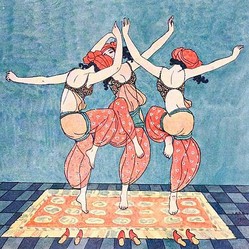It can be argued that many men forged the nation, England, and I am certain many of you can make a case for others. I invite you to add your choices, and the reasons why, in the comments section below. I feel these three are all significant, and shall confine the article to but these three men whom I have selected.
For several years I have been working on my ancestry, and I have multiple lines back to England. This has inspired me to delve into some history of England so I can better understand my own roots.
It is difficult to give an order to the prominence of each man, so I will present them chronologically.














 Multivariable Calculus: Gradient, Divergence, and Curlon 12/19/2025
Multivariable Calculus: Gradient, Divergence, and Curlon 12/19/2025
 UAPs, Formerly UFOs, If They Are Real How Can We Explain Their Arrival to Earth?on 12/18/2025
UAPs, Formerly UFOs, If They Are Real How Can We Explain Their Arrival to Earth?on 12/18/2025
 Polar Coordinate Systemon 12/16/2025
Polar Coordinate Systemon 12/16/2025
 Aurora Can Disrupt Electrical Devices And Even the Grid?on 12/15/2025
Aurora Can Disrupt Electrical Devices And Even the Grid?on 12/15/2025



Comments
I will certainly read it.
One Englishman from the Eleventh Century who deserves to be called great,yet is overlooked, is Saint Wulstan. What a man! A great friend of the poor and a dedicated opponent of slavery who successfully campaigned to make this atrocity socially and morally unacceptable. It is in the UK at the present minute past midnight, yet I feel an article coming on. Not tonight, but soon. My religious hero must not be forgotten.
Since only two men have been called "the Great" and William's reign was the greatest change in England I see no parallel in the tenth century. I am also partial since my ancestry includes the three mentioned.
blackspanielgallery, Who would you have selected from the tenth century?
Indeed the royals are never present when these places are open and many parts are private so yes ..why bother ? but people do.
The Conservative Party produces more than its fair share of mindless people. Some years ago certain of its members of parliament were objecting that students learned social and economic history. One of these politicians declared that history is about kings and battles. Ridiculous! But you can see why these characters objected to social and economic history, it was because they did not want the students to know how the ruling class was exploiting the people and just how bad things were and could still become.
I was impressed by the archaeologist Francis Pryor, who declared "What the aristocrats had for breakfast I leave to Starkey. I am concerned with the common people." Starkey is a very pro-royal historian. At school I studied social and economic history and loved it. Thanks to my late, great history teacher, Mr Weaver.
But then you would only get to the arts that are unuse, not where a curious person might want to go. I am certain you could not sit across the table from the queen, nor watch her television. So, is it really what people want who do pay?
On a personal level , I don't see why I should pay the wealthiest woman in the world even as little as a pound to repair her house because she hadn't got it insured.
The consequence was that the all Royal palaces and castles were opened to the paying public in order to pay for the repairs to Windsor which amounted to £65 million by today's standards. So we do pay for the repairs to Windsor if we choose to visit royal households.
Our history that we learn here is quite different, as history often is slanted by region. Perhaps a better word is incomplete. In fact, it concentrates little on what was going on other than who won which battle and what was the result. I learn much from you two.
I recall the fire, but had heard nothing of the request for funds.
I was afraid that Wizzley was gone and I would have lost a valuable source of information. For two days I could not log in, even to view comments.
The queen raised a paltry four thousand pounds for the repairs.
Monarchs became less murderous and fratricidal with the Hanoverians, simply because they had no opportunity for it, but drunkeness and fornication still carried on. The modern royals have ditched the drunkeness,well, most of them, most of the time!